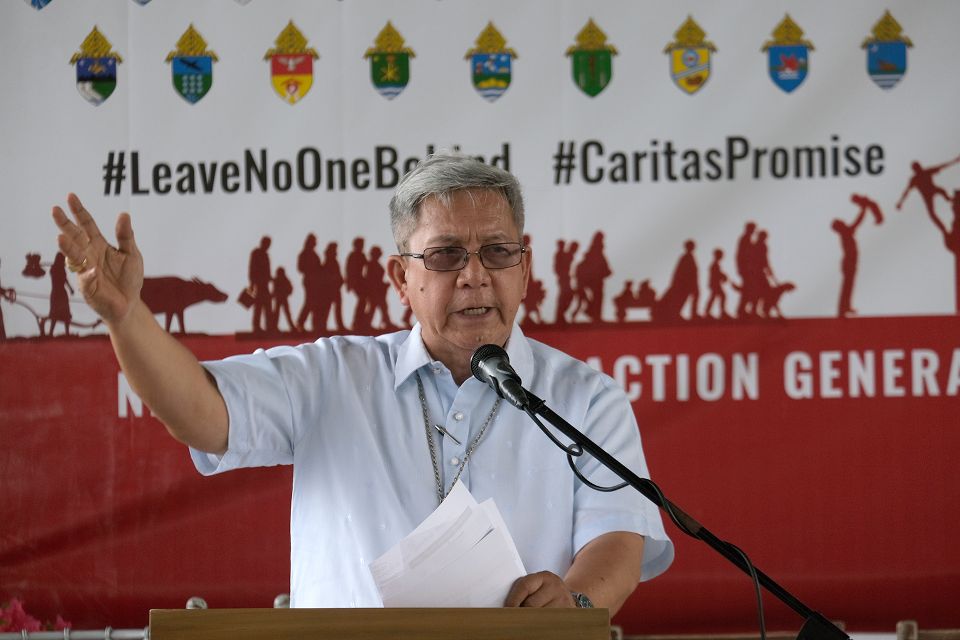 Caritas Philippines national director Bishop Jose Colin Bagaforo speaks at the 40th National Social Action General Assembly (NASAGA) in General Santos City, June 14, 2022. (Roy Lagarde)
Caritas Philippines national director Bishop Jose Colin Bagaforo speaks at the 40th National Social Action General Assembly (NASAGA) in General Santos City, June 14, 2022. (Roy Lagarde)
The Simbayanihan
Before the May 9 election the CBCP issued a pastoral letter telling the faithful to be concerned for the welfare of the nation and to ask for accountability and transparency from political/government leaders. Our archdiocese created a political action group to help the faithful in choosing the candidates who were running for public office. During the June 2022 40th National Social Action Assembly held in General Santos City, delegate Bishop Jose Colin Bagaforo, head of Caritas Philippines said that the church in the Philippines launched the Simbayanihan movement to help ensure good governance in the country.
In the Caritas Phil. website Bishop Bagaforo wrote, “now that the election is over, the focus on good governance is accountability and monitoring programs to ensure that our elected officials are really faithful to what they said during the campaign.” Caritas Philippines Executive Secretary, Fr. Antonio Labiao said the church is creating good governance advocates in the dioceses who will go to the parishes to promote Simbayanihan. The parishes in turn will go to the GKKs and Barangays to institutionalize good governance processes stressing the “need for continuing participation of the Church people for the renewal of society”.
About 70 million of the nation’s 110 million are Catholic. Maybe they are curious about Simbayanihan. 1. How long will this program last? Up to 2025 elections or will it be a permanent program? 2. Who will be the trainors, lecturers, speakers? Who will prepare the modules, charts, visual aids? 3. Will this be a separate parish program or will it be included in other parish programs like seminars/lectures for A. those getting married, B. baptisms, C. confirmation, D. monthly meetings of Knights of Columbus, Divine Mercy, Extraordinary ministers of Communion D.M.I., etc. 4. What, if any, will be the rule of catechists, the Catholic schools and the Catholic media (TV, Radio, Newspaper)?
Sometimes, Government and Justice are lumped together while religion and compassion are lumped as another concept. Justice sometimes may be seen as rigid, imposing certain rules/punishments without mercy or care for the well-being of those affected. A jobless man steals, so his family can eat. If convicted, how will his family survive? Sometimes compassion is seen as too softhearted, sentimental, without regard for fairness or equality. The convicted killer is pardoned because of old age, his prison time is reduced for good behavior; being poor as he cannot pay the medical and burial bills of his victims, yet he is conditionally pardoned, etc. Some might invoke the principle of separation of church and state and becloud our good intentions. We pray for guidance from above as we prepare for Simbayanihan.


Alfredo Bongbong C. Bautista.Sr.
Posted at 09:43h, 05 Julysimbahan at bayan ay iisa, magbayanihan sa ikabubuti ng smbayanan, kahit sa maliliit na bagay tulad ng basura ilagay sa tamang lagayan, mga pagkaing tira gawing pataba sa halaman, ibulsa ang maliliit na basura kung walang makitang basurahan, itoy maliit na bagay pero kung ginagawa ng marami itoy bayanihan ang pagiging bayani ay pagmamahal sa kapwa at kalikasan at itoy banal na utos ng Diyos kayat ang simbayanihan ay kilos di ng espirito santo patungo sa kabanalan at iyon naman talaga ang layon ng Diyos para sa atin angakarating sa kanyang kalulwahan., salamat.